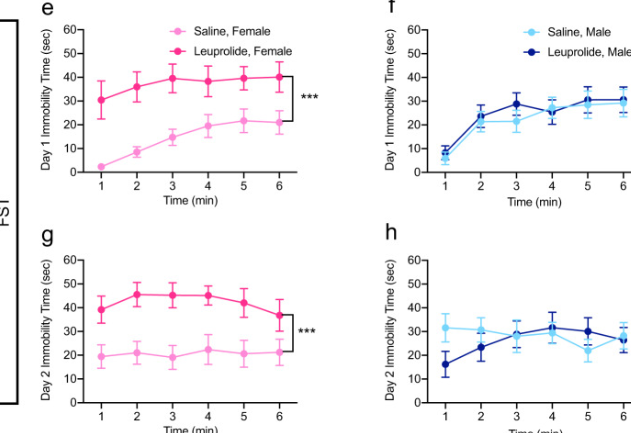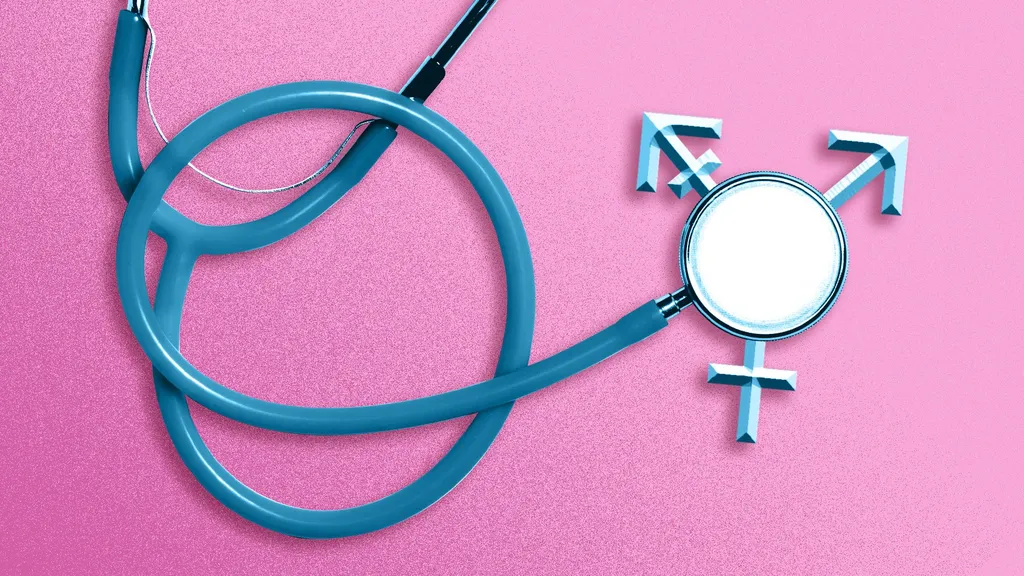Recent controversy around doctors prescribing puberty blockers for trans adolescents has sparked much debate and concerns in parents as well as doctors. It has also given rise to many questions. What are the side effects? Does it do more harm than good? Will the usage of puberty blockers increase mental well-being? Multiple articles and studies are analyzed to see if the benefits of puberty blocking medications outweigh the risks or if maybe more caution should be considered when prescribing them to minors.
What is gender dysphoria?
The Diagnostic and Statistical Manual of Mental Disorders (DSM 5) described gender dysphoria as an in congruence between someone’s sex and their gender identity, usually leading to distress about their primary and secondary sex characteristics; it marks a misalignment between the brain and the body. People who experience extreme gender dysphoria may seek out medical interventions such as surgeries and hormones to make themselves appear more like the opposite sex. In the past decade, there has been a startling increase in adolescents who desire gender-affirming treatment which has lead to arguments about how to properly treat it in minors.
People who support puberty blockers: What’s their stance?
Those who are for puberty blockers for minors believe that by withholding minors’ access from it would only make their mental health deteriorate. Most seem to believe that there is enough data available that proves how access to gender-affirming care like puberty blockers positively impacts their mental health and reduces suicide ideation, anxiety, and depression in adolescents. The most commonly referred to studies include two Dutch studies that examined adolescents’ mental health during and after undergoing gender-affirming care (puberty blockers, cross-sex hormones, and surgeries) and continuing to observe effects for about 20 years. These Dutch studies are one the oldest studies to date that relate to minors and gender-affirming care and are often referenced by medical professionals when deciding how to treat gender dysphoria. Another more recent study done by JAMA Network Open showed a positive effect puberty blockers have on adolescents’ mental health during treatment and followed up with the participants one year later.

Some Concerns About Puberty Blockers
Some common concerns are that people believe that there isn’t enough research to accurately tell if the benefits outweigh the risks when it comes to giving puberty blockers to minors. Some believe that more time is needed to see if puberty blockers positively impact mental health. Others, however, are more concerned about the side effects and impacts it can have on the adolescent mind and body. Many people who are against puberty blockers for minors don’t fully believe that the adverse effects caused are reversible.
The 1998 and 2014 Dutch Studies: A Reliable Source or Critically Flawed?
These Dutch studies are commonly referenced when deciding gender-affirming treatment. They state that gender dysphoric adolescents who are showing signs of puberty are eligible to take puberty suppression medications. Medical professionals have referred to the Dutch Protocol as the “gold standard approach” when dealing with gender dysphoric teens and adolescents. However, in recent years, authors have started to question the credibility of these studies. After reevaluation, there are noticeable inconsistencies and flawed methodologies used.
-
Only the best case scenario was recorded: Adolescents who successfully went through the treatment for puberty blockers were the only ones who went on to cross-sex hormones. The researchers excluded those who stopped treatment or had medical complications that were directly caused by puberty blockers. Same thing happened in the second study when their 70 participants dropped to 55 and the 15 who stopped undergoing HRT (hormone replacement therapy) were dropped into the “non-participant” category and were completely excluded from the results and conclusion. People question the credibility since this methodology would only record the best case scenarios and leave out any possible risks and negative mental health outcomes that came with the gender-affirming treatment.
-
The conclusion that gender dysphoria disappeared after treatment is false: There has been misuse of the UGD (Utrecht Gender Dysphoria) scale in the 2014 study. The wording of the gender dysphoria questions would switch from male to female (and vice versa) before and after treatment, and the scoring was reversed, making it seem like their gender dysphoria seemingly disappeared after undergoing HRT. After the study, some participants have even admitted that they still felt gender dysphoric towards their bodies despite the Dutch study claiming that any semblance of gender dysphoria was gone. There was no valid way for the researchers to measure the amount of gender dysphoria the participants felt after treatment.
-
Therapy and Hormones: Since all subjects were undergoing psychotherapy during the studies, it’s unclear about which intervention worked. It was impossible to determine which of the two helped, undergoing hormones and surgery or therapy.
- Researchers disregarded physical health: The researchers conducting these studies did not attempt to record or evaluate any physical health risks that hormones could cause and only reported the participants’ mental well-being.
- Authors claim that there is clear bias and incomplete analyses within these studies and shouldn’t be referenced or used when treating gender dysphoria. People argue that by referencing these studies, medical professionals have a higher chance of giving minors medical treatment that’ll have the opposite effect and worsen their physical and mental state.
Any Negative Side Effects?
There has been much debate about the adverse effects of puberty blockers. Information about any immediate physical effects are provided. Since hormones like testosterone and estrogen promote bone growth and bone structure, adolescents will experience reduced bone density that can lead to osteoperosis. Weakened bones can lead to frequent fractures. However, with frequent check-ups and a good doctor, the risk of getting osteperosis lowers. Puberty blockers also slow height growth and completely stop pubic hair growth. In females, it will also stop their menstruation cycle and the production of eggs. Doctors recommend being on puberty blockers for 1-2 years; however, the duration can differ on a case-by-case basis. Puberty blockers alone shouldn’t impair fertility if taken as instructed. However, if the patient is on puberty blockers longer than recommended, it can negatively impact their fertility. If a patient wants to discontinue taking puberty blockers, their puberty will begin again after a few months. The possible physical risks that may lead into adulthood are reduced bone density and shortened height. Because of this, many organizations such as the UCLA Gender Health Program and Provincial Health Services Authority claim that the negative effects of puberty blockers on minors are “reversible” at best and “minimal” at worst.
Unknown Effects?
People have questioned other impacts it could have. There is research about the immediate physical effects of puberty blockers. But what about the psychological effects it could have? The long-term effects? What will happen five or ten years after the treatment? There have been concerns about possible brain impairment due to puberty blockers. Surprisingly, the effects puberty blockers has on the brain along with any long-term side effects remains largely unknown. Medical professionals have admitted that not enough data or research currently exists to tell what kind of impact it could have on minors.
Mice and…Sheep? Recent animal studies show that puberty blockers may negatively affect brain development.
An animal study was performed and published in 2020 by Dr. Christopher Anacker on male and female mice. He separated the males and females into two groups: one group was given puberty blockers and the other wasn’t, acting as a control group. He wanted to closely analyze any possible behavioral and neurological effects in the mice. Anacker found that puberty blockers worsened anxiety and “despair-like” behaviors that closely relate to depression in female mice. He also found that there was an increase in brain activity in female mice and excessive amounts of stress hormones were released after exposure to mild stressors. Both of these effects were absent in male mice.

Another study in 2017, performed by veterinarian Dr. Denise Houghs, observed how discontinuation of puberty blockers could affect memory on sheep. Houghs has found that the sheep suffered long-term spatial memory and impaired their cognitive abilities. Furthermore, Houghs has noted that these adverse effects followed them into adulthood and could not be reversed. She has also noticed that the sheep would react more emotionally to mild stressors and that there was a noticeable lack of motivation to complete mazes/puzzles compared to the control group. Of course, since these behaviors are observed through animals it isn’t certain whether the same effects will show up for humans, but it does raise some questions about how puberty blockers affect the brain’s functions and development.
Puberty Blockers and Adolescent Mental Health
The argument for allowing minors to have access to puberty blockers is that it will help reduce anxiety and depression and that by witholding these medications will only deterioirate their mental health. There have been some small scale studies that help to support this statement. Two studies posted by the JAMA Network Open report a lower risk of suicide ideation in adolescents after a year of taking puberty blockers and/or hormones. Another study published by the American Academy of Pediatrics reported similar outcomes: 60% decrease in moderate and severe depression and 73% decrease in suicidality. However, there are some medical professionals who are skeptical about these results. One concern is that these studies are short-term. Most of them follow up with the participants one to two years after undergoing treatment. Thus far, from those who have detransitioned, they have been on gender-affirming care for on average 4-8 years before eventually discontinuing it. People argue that most studies that only follow up with adolescents’ a couple years after treatment are misrepresenting data and that there should be more studies that observe the mental health effects for a longer period of time.
Lack of Long-Term Studies
There are little to no long-term studies done that prove how early access to puberty blockers affect mental health. The main reason for this is that most adolescents who go on puberty blockers at an early age don’t follow up with the researchers or gender clinics when they go into adulthood years later. However, there has been one long-term study that was recently published in 2019 by The American Journal of Psychiatry. They found a correlation between gender-affirming care and lower levels of treatments for mood disorders, like anxiety, along with reduced suicide ideation. They looked at medical records of patients in Sweden who had started to undergo gender-affirming care and their frequent treatments and psychiatric visits. They then compared their frequency in visits for mood disorders ten years after being on gender-affirming care and noticed a decrease in both visits and treatments.
However, some medical organizations that have reviewed this study found the results to be questionable. Some concerns included but weren’t limited to…
-
No clear demonstration that gender-affirming treatment was the direct cause of the health benefits shown.
-
The lack of research etiquette (no study design limitations). This made it so that outside factors (family, social support, financial status, environmental factors, etc.) could’ve played a role in their mental health but was never reported or taken into account.
Originally, the AJP had claimed that this result shows beneficial long-term effects of allowing people access to gender-affirming care. But after reevaluation and constructive criticism that came from other researchers and health professionals, AJP has since rescinded their statement and updated their study findings.
Conclusion
There is a lot of unknown information when it comes to using puberty blockers for adolescents. Currently, there’s no research of long-term effects or psychological effects that puberty blockers have on minors. There’s not much data that supports the notion that minors’ access to puberty blockers will give them long-term mental health benefits, and long-term studies that do support this notion use flawed methodologies that makes its credibility questionable.
There are some medical professionals who do believe that there is some use to allowing gender-affirming medications but, due to its many unknown side effects, suggest that it should be the absolute last resort when treating gender dysphoric youth and not the first.
Countries such as Sweden and Finland are now taking more caution around giving medications such as puberty blockers to minors and is starting to turn to more traditional approaches such as psychotherapy, behavioral therapy, and counseling, to help those suffering from gender dysphoria.
Works Cited
- Anacker, C. et al. (2021) Behavioral and neurobiological effects of GnRH agonist treatment in mice-potential implications for puberty suppression in transgender individuals, Neuropsychopharmacology : official publication of the American College of Neuropsychopharmacology. Available at: https://www.ncbi.nlm.nih.gov/pmc/articles/PMC8115503/ (Accessed: 15 November 2023).
- Anderson, D. et al. (2022) Gender dysphoria and its non-surgical and surgical treatments, Health psychology research. Available at: https://www.ncbi.nlm.nih.gov/pmc/articles/PMC9501960/ (Accessed: 15 November 2023).
- Bränström, R. et al. (2019) Reduction in mental health treatment utilization among transgender individuals after gender-affirming surgeries: A total population study, American Journal of Psychiatry. Available at: https://ajp.psychiatryonline.org/doi/10.1176/appi.ajp.2019.19010080 (Accessed: 15 November 2023).
- Correction of a key study: No evidence of ‘gender-affirming’ surgeries improving mental health (2020) Home. Available at: https://segm.org/ajp_correction_2020 (Accessed: 17 November 2023).
- Deacon, R.M.J. (2011) Hyponeophagia: A measure of anxiety in the mouse, Journal of visualized experiments : JoVE. Available at: https://www.ncbi.nlm.nih.gov/pmc/articles/PMC3197427/ (Accessed: 15 November 2023).
- de Vries AL;McGuire JK;Steensma TD;Wagenaar EC;Doreleijers TA;Cohen-Kettenis PT; (2014) Young adult psychological outcome after puberty suppression and gender reassignment, Pediatrics. Available at: https://pubmed.ncbi.nlm.nih.gov/25201798/ (Accessed: 17 November 2023).
- (2018) Gender Dysphoria in Children. Available at: https://acpeds.org/position-statements/gender-dysphoria-in-children (Accessed: 15 November 2023).
- Hough, D. et al. (2017) A reduction in long-term spatial memory persists after discontinuation of peripubertal GnRH agonist treatment in sheep, Psychoneuroendocrinology. Available at: https://www.ncbi.nlm.nih.gov/pmc/articles/PMC5333793/ (Accessed: 15 November 2023).
- Kirralie Smith June 22, 2022 (2022) Unknown effects of puberty blockers on the brain, Binary. Available at: https://www.binary.org.au/unknown_effects_of_puberty_blockers_on_the_brain (Accessed: 15 November 2023).
- Lieke Josephina Jeanne Johanna Vrouenraets, Ms. and Martine C de Vries, M. (2020) Gender dysphoria: The Dutch protocol, Contemporary OB/GYN. Available at: https://www.contemporaryobgyn.net/view/gender-dysphoria-dutch-protocol (Accessed: 15 November 2023).
- New systematic reviews of puberty blockers and cross-sex hormones published by nice (2021) Home. Available at: https://segm.org/NICE_gender_medicine_systematic_review_finds_poor_quality_evidence (Accessed: 15 November 2023).
- Puberty blockers for youth (2023) Provincial Health Services Authority. Available at: http://www.phsa.ca/transcarebc/childyouth/affirmation-transition/medical-affirmation-transition/puberty-blockers-for-youth (Accessed: 15 November 2023).
- Research finds significant reduction in depression, suicidality in youth receiving gender-affirming care or puberty blockers (2021) Home. Available at: https://www.aap.org/en/news-room/news-releases-from-aap-conferences/research-finds-significant-reduction-in-depression-suicidality-in-youth-receiving-gender-affirming-care-or-puberty-blockers/ (Accessed: 15 November 2023).
- Schneider, M.A. et al. (2017) Brain maturation, cognition and voice pattern in a gender dysphoria case under pubertal suppression, Frontiers in human neuroscience. Available at: https://www.ncbi.nlm.nih.gov/pmc/articles/PMC5694455/ (Accessed: 15 November 2023).
- The Dutch studies and the myth of Reliable Research in Pediatric Gender Medicine (2023) Home. Available at: https://segm.org/Dutch-studies-critically-flawed (Accessed: 15 November 2023).





















